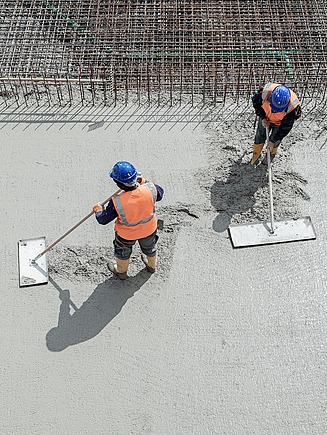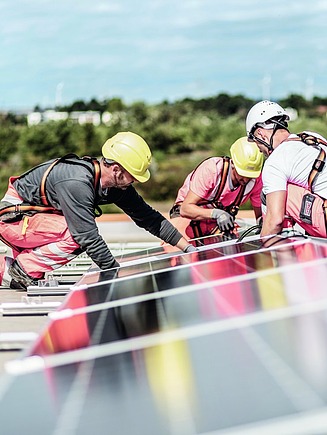Eigenrieden quarry: How we extract our raw materials in a climate-friendly way
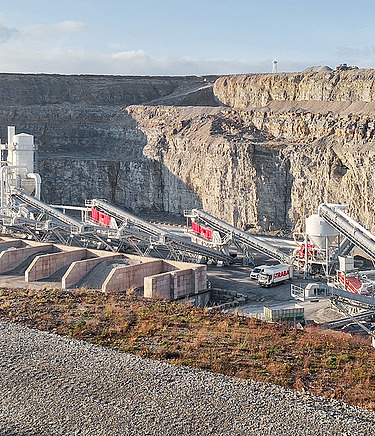
STRABAG pilot project of Mineral Baustoff GmbH for decarbonisation in Thuringia
At the Eigenrieden limestone quarry, we want to gradually reduce CO₂ emissions from raw material extraction and the production of building material mixtures and grit, with the aim of operating Germany's first climate-neutral quarry at by the end of the current decade . This pilot project for decarbonisation makes the Thuringian site of our subsidiary Mineral Baustoff GmbH an industry pioneer in sustainability, environmental protection and innovation. It is intended to set a precedent and serve as a model for the climate-friendly conversion of other raw material sites belonging to the STRABAG Group.
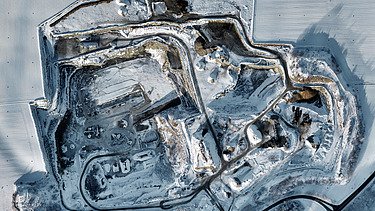
The Eigenrieden limestone quarry currently has reserves of approximately six million tonnes of rock in the lower Muschelkalk layers; Mineral Baustoff GmbH produces around 220,000 tonnes of building material mixtures and grit here every year. Before the pilot project started, the plant technology and construction machinery in the quarry were conventionally powered by diesel. As a result, the site produced around 490 tonnes of CO2 emissions annually. By the end of the current decade, these carbon dioxide emissions are to be gradually reduced to almost zero through several sub-projects. To achieve decarbonisation, Mineral Baustoff GmbH is focusing on converting its previously diesel-powered technology to electricity or electric drives and climate-friendly fuels – step by step and across all three stages of the production process: extraction, processing and loading.

New processing plant: PV panels for sustainable solar power
At the end of 2023, a highly efficient, electrically powered, stationary processing plant replaced the previously used diesel-powered mobile equipment. Like all STRABAG sites and construction sites in Germany, the new crushing and screening plant will initially be powered by green electricity from hydropower. A powerful dust extraction system and noise-insulating enclosures for crushers, screening machines and conveyor belts also minimise dust and noise emissions.
From 2026 onwards, the energy required for raw material processing will be largely covered by solar power generated by the company's own photovoltaic system. To this end, a PV system with electricity storage will be built on a neighbouring 1.4-hectare open space, which STRABAG will commission at the end of 2025.
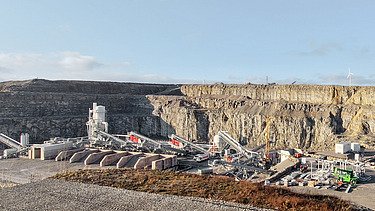
CO2 emissions reduced by up to 90 per cent with HVO diesel
To reduce CO2 emissions in raw material extraction, STRABAG is taking the first step of switching to climate-friendly fuel for dumpers and construction machinery in its quarry: From mid-2026, the two heavy-duty dump trucks used to transport raw stone will be powered by HVO diesel made from hydrogenated vegetable oils instead of conventional diesel made from fossil petroleum. The same applies to two large wheel loaders used to load the produced building material mixtures and to the heavy excavator that loads the dump trucks with limestone.
The climate impact during operation is considerable: replacing fossil diesel with HVO (hydrotreated vegetable oil) can reduce CO₂ emissions by up to 90 per cent. In a comparison of environmental performance, HVO also scores points for cleaner combustion. Since HVO does not contain any sulphur or nitrogen compounds, its combustion produces fewer emissions of nitrogen oxides and particulate matter.
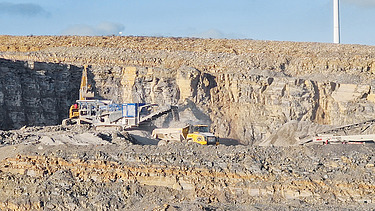
The goal is to switch to electric drives
The conversion of dump trucks, wheel loaders and excavators to HVO in Eigenrieden is intended to bridge the gap until electric drives or hybrid solutions have also established themselves on the market for heavy machinery. With a view to the continued decarbonisation of quarry operations, Mineral Baustoff GmbH remains firmly committed to electric motors in the construction machinery it uses. Autonomously operated electric dump trucks had already been extensively tested in Eigenrieden for the ELMAR (Electrification of Heavy Transport Machines in the Raw Materials Industry) research project. The originally planned switch to the innovative vehicle failed because the manufacturer Volvo will not be bringing this prototype to market.
In order to decarbonise raw stone transport, STRABAG intends to use articulated electric dump trucks in the quarry as soon as they become available on the market. This is not yet the case, but manufacturers are already planning to test such prototypes. Articulated dumpers are better suited to the needs of the Eigenrieden quarry as they are lighter and more manoeuvrable than dumpers with rigid frames. The two wheel loaders and the excavator in the quarry are also to be converted to electric models as soon as possible. Another conceivable alternative could be a heavy-duty excavator with fuel-efficient hybrid drive and energy recovery.
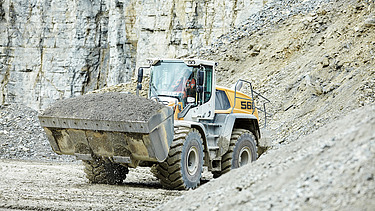
Factsheet

Quarry Eigenrieden
